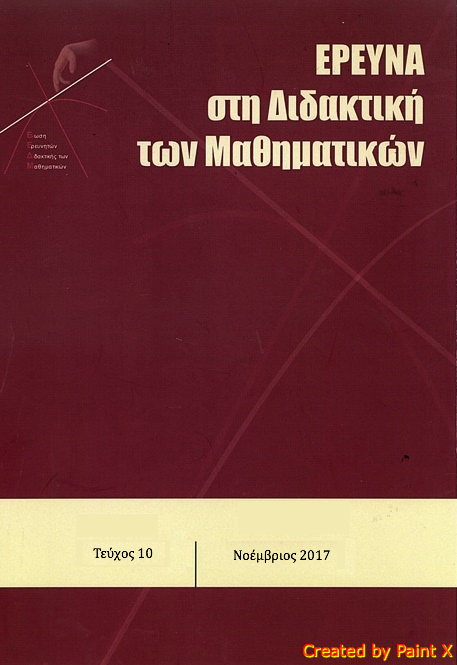ΔΙΔΑΣΚΑΛΙΑ ΜΑΘΗΜΑΤΙΚΩΝ ΣΕ ΜΑΘΗΤΕΣ ΜΕ ΝΟΗΤΙΚΗ ΑΝΑΠΗΡΙΑ: ΜΑΘΗΣΗ ΣΕ ΑΥΘΕΝΤΙΚΑ ΠΕΡΙΒΑΛΛΟΝΤΑ ΜΕ ΤΗΝ ΥΠΟΣΤΗΡΙΞΗ ΔΙΚΤΥΟΥ ΓΟΝΕΩΝ ΚΑΙ ΣΧΟΛΕΙΟΥ
Resumen
Η παρούσα μελέτη αποτελεί μέρος μιας ευρύτερης έρευνας-δράσης, όπου η διδασκαλία και η μάθηση των μαθηματικών σε μαθητές με νοητική αναπηρία εξετάζονται ως κοινωνικά και πολιτισμικά ενταγμένες διαδικασίες. Ο στόχος της έρευνας είναι να μελετηθεί με ποιον τρόπο η δημιουργία συνεργασίας μεταξύ σχολείου και οικογένειας επηρεάζει την εκπαιδευτική διαδικασία και την ενεργή συμμετοχή των μαθητών σε κοινωνικές δραστηριότητες που συμβάλλουν στην ανάπτυξη της μαθηματικής σκέψης. Οι μαθητές συμμετείχαν σε δραστηριότητες χρηματικών συναλλαγών στην κοινότητα, ενώ παράλληλα ενθαρρύνονταν οι μητέρες να υλοποιήσουν παρόμοιες δράσεις εκτός του σχολικού πλαισίου. Από τα αποτελέσματα αναδεικνύεται ότι οι συζητήσεις με τις μητέρες ενίσχυσαν την επιλογή διδακτικών στόχων και πλαισίων μάθησης που έχουν νόημα για τους μαθητές. Αντίθετα, παράγοντες όπως οι αντιλήψεις των μητέρων για την κοινωνική ένταξη-και κυρίως για το στίγμα των ατόμων με αναπηρία-περιόρισαν την ενεργή συμμετοχή των μαθητών σε δραστηριότητες εκτός του σχολικού πλαισίου.
Article Details
- Cómo citar
-
Χρυσικού (Vasiliki Chrysikou) Β. (2017). ΔΙΔΑΣΚΑΛΙΑ ΜΑΘΗΜΑΤΙΚΩΝ ΣΕ ΜΑΘΗΤΕΣ ΜΕ ΝΟΗΤΙΚΗ ΑΝΑΠΗΡΙΑ: ΜΑΘΗΣΗ ΣΕ ΑΥΘΕΝΤΙΚΑ ΠΕΡΙΒΑΛΛΟΝΤΑ ΜΕ ΤΗΝ ΥΠΟΣΤΗΡΙΞΗ ΔΙΚΤΥΟΥ ΓΟΝΕΩΝ ΚΑΙ ΣΧΟΛΕΙΟΥ. Έρευνα στη Διδακτική των Μαθηματικών, (10), 73–90. https://doi.org/10.12681/enedim.15224
- Sección
- Άρθρα

Esta obra está bajo una licencia internacional Creative Commons Atribución 4.0.
Οι συγγραφείς των άρθρων που δημοσιεύονται στο περιοδικό διατηρούν τα δικαιώματα πνευματικής ιδιοκτησίας επί των άρθρων τους, δίνοντας στο περιοδικό το δικαίωμα της πρώτης δημοσίευσης. Άρθρα που δημοσιεύονται στο περιοδικό διατίθενται με άδεια Creative Commons BY και σύμφωνα με την άδεια μπορούν να χρησιμοποιούνται ελεύθερα, με αναφορά στο/στη συγγραφέα και στην πρώτη δημοσίευση.


